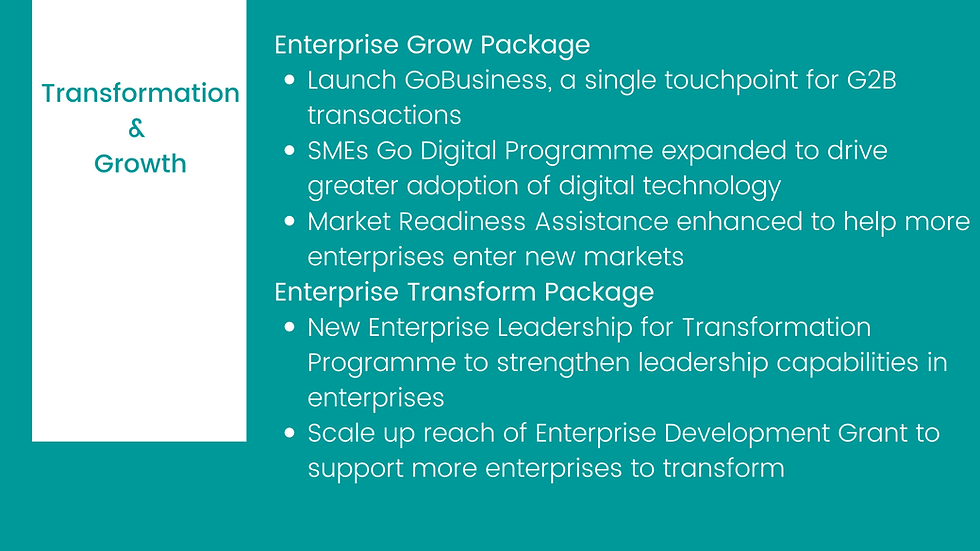Singapore Budget 2020: 2 Key Takeaways for Organizations
- Feb 19, 2020
- 2 min read
Updated: Feb 20, 2020

Singapore has introduced an extraordinary budget with Budget 2020. It introduces initiatives and policies for striking a balance between addressing what is urgent in the short-term and what is important in the long-term. It addresses the pressing challenges of COVID-19, while keeping in mind the long-term plan for digitialization and growing of Singapore's economy.
The outlook for Singapore's economy has been weakened by the outbreak of COVID-19, with the government reducing its gross domestic product forecast to as low as a 0.5% decline, compared to the 0.5- 2.5% growth that was previously predicted. A growing number of organizations have lowered their economic growth forecasts as well, especially within the industries heavily reliant on China's economy and tourism. In these volatile times, all eyes are on Singapore's annual budget to understand the help measures deployed to support businesses and individuals in navigating and adapting to these various changes.

Stabilization and support initiatives developed from a budget of $4 billion such as rent waivers, cash flow loans and rebates have been rolled out for enterprises and individuals most affected, such as those in the tourism, transport, food and retail sectors.

Meanwhile, another $8.3 billion has been set aside to drive transformation and growth across sectors over the next 3 years. This budget will be invested into programs like Skillsfuture to address re-skilling and provide opportunities for workers that embrace the ethos of lifelong learning. There will be a $500 SkillsFuture Credit top-ups for adult Singaporeans aged 25 and above, as well as a special $500 top-up for Singaporeans aged 40 to 60. Whether people are searching for their first job and just starting out, or mid-career, this investment enables employees to up-skill and ensure that all members of the organization are up-to-date with the demands of technological advancement.
Budget 2020 also offers support for firms to training and redesigning jobs, and re-skilling workers to support more local workers in 40s and 50s in career transitions. These incentives featured encourage organizations to move up the innovation ladder and focus more on learning and development of manpower. Enterprise growth and transformation packages for driving adoption of digital technology to back the nation's digital transformation effort and programs for training and developing leadership capabilities have been rolled out.
What we can take away from the strategies and measures in Budget 2020 is that the present focus is directed at helping organizations innovate and advance in this digital space and age. There is also an emphasis on promoting the flourishing of talent in individuals across industries. Mr Heng, the finance minister, was quoted as saying:
For enterprises to transform, they also need to strengthen their leadership and management capabilities.
Organizations can work towards this by taking advantage of the policies rolled out to nurture skilled and adaptable workers to help the organization reach new heights and success, and increase their capabilities for remaining competitive in this rapidly changing environment. All in all, there are two key points for organizations to note.
ONE. Upskilling is a must-do, and no longer optional.
TWO. They must adapt to this digital age or risk being erased from the market.
The tools to drive change in your organization are being presented to you. Don't let your organization fall behind by resisting change and failing to adapt.
.png)



Comments